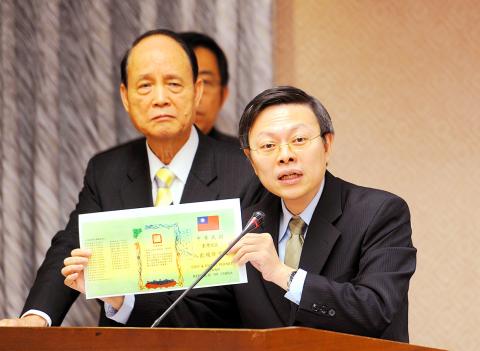|
Taipei tells China to
note indignation over passport
‘INVALID’: Taipei’s efforts to explain its
indignation with the passports were dismissed as invalid by Beijing, which said
pro-independence activist were just making a fuss
By J. Michael Cole / Staff reporter, with CNA

Mainland Affairs Council Minister
Wang Yu-chi, right, yesterday tells the legislature that the Straits Exchange
Foundation has written to the Association for Relations Across the Taiwan
Straits to explain Taiwan’s position on the depiction of Taiwanese territory as
Beijing’s in new Chinese passports.
Photo: Lo Pei-der, Taipei Times
In unusually direct language, Taipei
yesterday called on Beijing to pay more attention to Taiwan’s position on
China’s controversial new passport, saying that China’s refusal to acknowledge
its indignation had “hurt the feelings” of Taiwanese.
At the heart of the controversy is a new passport that the People’s Republic of
China (PRC) began issuing in May, which features watermarks that include famous
tourist attractions in Taiwan, such as Nantou’s Sun Moon Lake and Hualien’s
Chingshui Cliffs; Arunachal Pradesh and Aksai Chin — areas whose sovereignty
Beijing disputes with India; and 90 percent of the South China Sea.
Countries in the region, including Vietnam, India and the Philippines, reacted
with indignation when the contents of the new passport were reported in news
articles last month, making demarches to Beijing and issuing visas to Chinese
visitors bearing imprints of their own rectified maps.
Taiwan’s response to the inclusion of its territory in the passport was much
more muted than that of the other countries, prompting accusations that
President Ma Ying-jeou (馬英九) was not being vocal enough in asserting Taiwan’s
independence and had failed to take seriously the implications of China’s action
on the nation’s sovereign status.
Mainland Affairs Council Minister Wang Yu-chi (王郁琦) told the legislature
yesterday that the Straits Exchange Foundation (SEF) had written to the
Association for Relations Across the Taiwan Straits (ARATS) last week to explain
Taiwan’s position on the matter.
The SEF and ARATS are semi-official bodies created to handle cross-strait
affairs in the absence of official bilateral diplomatic relations.
In a reply received on Wednesday, ARATS dismissed Taiwan’s protest as “invalid,”
adding that the design of the new passport had only become an issue after
“pro-independence activists” had “made a fuss” over the matter, Wang said.
Wang said that Beijing’s response misrepresented the situation and he urged
China to pay greater attention to Taiwan’s indignation over the passports.
“This incident is not a partisan concern, nor does it bother only a small number
of people in Taiwan,” he said, dispelling the notion that only supporters of
Taiwanese independence had been angered. “If the mainland authorities fail to
realize this, the development of relations across the Taiwan Strait will be
undermined.”
Beijing’s handling of the matter is “unacceptable” to Taiwan because it
demonstrates that Beijing does not realize how serious an impact the incident
has had on cross-strait ties, he said, adding that ties between Taiwan and China
were defined as “special relations” rather than direct state-to-state relations,
echoing remarks made by Ma the previous day.
Taiwan’s territory as outlined in the Republic of China (ROC) Constitution
includes China, but at present its jurisdiction covers only Taiwan and the
outlying islands of Penghu, Kinmen and Matsu, he said.
Democratic Progressive Party (DPP) legislators last week demanded that SEF
Chairman Lin Join-sane (林中森) step down after he said that Chinese officials had
assured him that the new passport had not been designed with any “particular
motive in mind,” except to be “trendy.”
In reaction to what it called an insufficiently assertive reaction to the matter
on behalf of the government, the DPP began issuing passport stickers earlier
this month featuring a map of Taiwan and its outlying islands over which a text
reading: “Taiwan is my country” was superimposed.
Although the ROC does not recognize PRC passports and Chinese visitors who come
to Taiwan are required to apply for a “compatriot pass” issued by the National
Immigration Agency, the process nevertheless requires a passport.
|
![]()
![]()
![]()